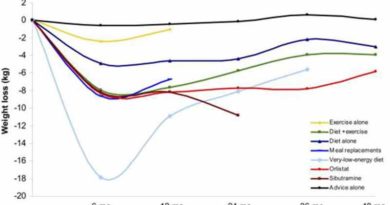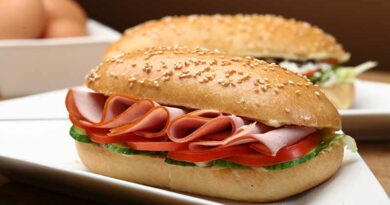Just cut fat to cut fat?!
An article was published in the British Medical Journal (BMJ) on Thursday 6th December 2012. It led to a few articles in the media on Friday 7th December. The BMJ article was called: “Effect of reducing total fat intake on body weight: systematic review and meta-analysis of randomised controlled trials and cohort studies“.
It wasn’t exactly a headline story – the Mail covered it as shown here. New Scientist were not very scientific making this comment about the article “The pounds fell off when they changed to a diet containing less fat.” You’ll laugh when you see what the weight loss was after at least six months!
The study objective was “To investigate the relation between total fat intake and body weight in adults and children.”
No specific study was done to investigate this – instead the researchers looked for existing trials that compared ‘normal’ fat intake vs. reduced fat intake as a study intervention and included studies that followed up participants after at least six months.
The results were: “…diets lower in total fat were associated with lower relative body weight by 1.6 kg”. That’s 3.5lbs.
My points are as follows:
1.6kg is tiny!
Many of the interventions (listed in Table 1 in the BMJ paper) required fat intake to be no more than 15% of total calorie intake, as opposed to the more typical intake of 30%. That’s a heck of a dietary change to have an impact of a couple of pounds over several months. My hubby can lose this much in one day when Wales are playing rugby! This really is inconsequential.
What is defined as fat?
There is no detail whatsoever in the BMJ article on precise dietary changes. Let us remember that our government authorities don’t know the difference between fats and carbohydrates. The UK Food Standards Agency and National Health Service list of saturated fats feature[i]: pies, pastries, cakes, biscuits, savoury snacks, sweets, chocolate and ice cream.
They also list “fatty cuts of meat”, which is ignorant as meat is mostly water, then protein, then unsaturated fat and then saturated fat. For example, a typical sirloin steak is 71% water, 21% protein, 3.3% unsaturated fat and 2.1% saturated fat (minerals etc make up the difference and rounding errors). Saturated fat literally is the last thing that steak is. They also list dairy products – which are a source of fat (and protein), but they are also an excellent source of calcium, phosphorus and the fat soluble vitamins, A, D, E and K.
The UK is not alone in not knowing the difference between fats and carbs. The Dietary Guidelines for Americans 2005 list: ice cream; sherbet; frozen yogurt; cakes; cookies; quick breads; doughnuts; margarine; sausages; potato chips; corn chips; popcorn and yeast bread as major sources of saturated fats. The Australian Government “Measure Up campaign” lists fatty processed meats and baked cereal based foods such as cakes, pastries and biscuits as sources of saturated fat.
What nutrition was lost?
If people in the intervention groups cut back on pies, pastries, cakes, biscuits, savoury snacks, sweets, chocolate and ice cream, I am only surprised that they didn’t lose more weight. This would have been a positive intervention for weight and health, but it should have been reported as “Cut out junk to lose fat”. If participants cut back on meat and dairy products, they would have lost vital nutrients, essential fats and complete protein.
The government’s own data shows that the UK is badly deficient in fat soluble vitamins.[ii] If any reduction in real food has occurred, with its life vital fats lost, this will have a long term detriment to human health.
The fact is that we don’t know what people cut back on.
“People cut out olive oil, the darling of The Mediterranean Diet, and lose a couple of pounds” may have been an interesting headline.
“People cut out dairy products and suffer bone damage” may have been an interesting headline.
“People cut processed food, in the name of fat, and lose a couple of pounds” quite rightly didn’t make the front pages!
What could the intervention group have lost?
The tragedy of this study is twofold:
1) it continues to perpetuate the demonisation of fat (and real food), which continues to drive people down the route of eating more carbohydrate (and processed food) and
2) it is a huge missed opportunity. The combined studies involved 73,589 people. Imagine that we had been able to get this number of people to eat nothing but real food and compare them to a control group still following the government eat badly plate advice and thereby eating mostly processed food.
Imagine that we had been able to do this for a period of six months, to meet the minimum follow up criteria. The real food group would most likely be at natural weight within this time, unless they have several stones to lose. Someone with six stone or more to lose should lose 50lb in six months – not a couple of pounds – and keep the weight off, as eating better rather than less doesn’t adversely impact hunger or metabolism.
“Eat real food, lose weight, gain health and stay that way!” Now that would have been a great headline!




Zoe,
This CNN article points out the obvious – American’s diet changed for the worse suddenly in 1980, and shows a new study comparing 16 peer countries’ life expectancy… yet the author places the blame on the American health care system along with other non-diet related causes. Clearly there are serious issues with that, however, there is no mention of diet being the cause of a lower life expectancy in States than in 27 other countries.
http://www.cnn.com/2013/01/09/health/international-health-report/index.html?hpt=hp_t3
Hope you find this an interesting read.
M
Hi Marianne – great find! I’ll tweet this – dismissed with the usual “there are lots of causes” excuse. One massive one stands out though eh?!
Many thanks for this – Zoe
Peter Attia also did a good breakdown of this review. His point was, that in almost every paper (more than 90% of the patients) the low-fat dieters were given ongoing support, the controls got none. You would expect the people who were supported and encouraged to do a bit better than the people who were ignored with any diet.